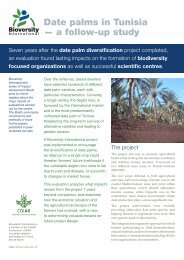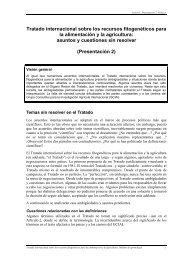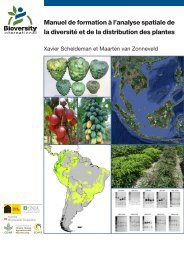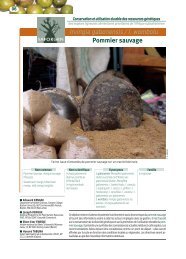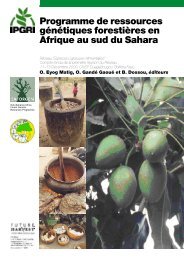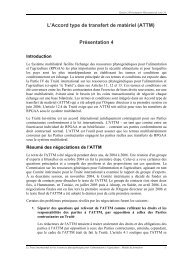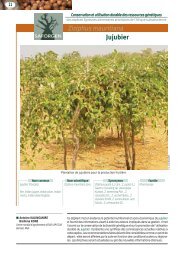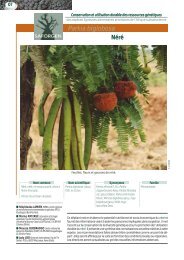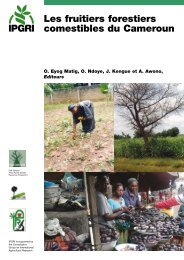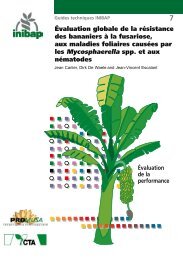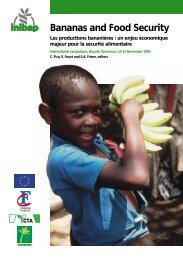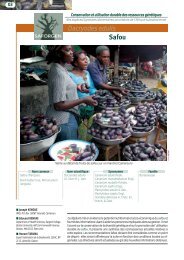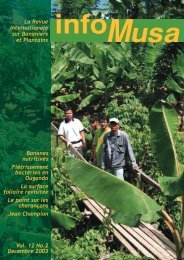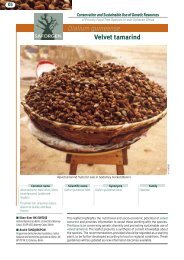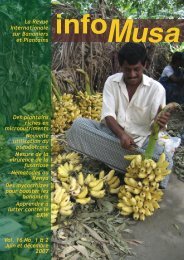Rocket: a Mediterranean crop for the world - Bioversity International
Rocket: a Mediterranean crop for the world - Bioversity International
Rocket: a Mediterranean crop for the world - Bioversity International
Create successful ePaper yourself
Turn your PDF publications into a flip-book with our unique Google optimized e-Paper software.
6<br />
ROCKET GENETIC RESOURCES NETWORK<br />
Table 1. Origin of rocket samples stored at <strong>the</strong> USDA genebank<br />
Origin No. of samples<br />
USA 1<br />
UK 2<br />
Pakistan 114<br />
Turkey 9<br />
India 9<br />
Egypt 1<br />
Iran 11<br />
Afghanistan 3<br />
Spain 2<br />
Poland 1<br />
Cyprus 1<br />
Czechoslovakia 1<br />
<strong>Rocket</strong> genetic resources activity at IdG<br />
The Germplasm Institute is one of <strong>the</strong> over 300 main entities of <strong>the</strong> CNR, <strong>the</strong> Italian<br />
National Research Council (Consiglio Nazionale delle Ricerche), and is located in<br />
Bari, sou<strong>the</strong>ast Italy. It represents <strong>the</strong> only Italian genebank sensu stricto, that is <strong>the</strong><br />
only public institution specifically and institutionally devoted to plant genetic<br />
resources (PGR) collection, conservation, documentation and evaluation. The IdG<br />
was established in 1970 with <strong>the</strong> name Germplasm Laboratory (Laboratorio del<br />
Germoplasma) and gained <strong>the</strong> status of Institute in 1981, when <strong>the</strong> President of<br />
CNR recognized "its outstanding activity in <strong>the</strong> preservation of plant genetic<br />
resources of use to <strong>the</strong> <strong>Mediterranean</strong> and European agriculture". The Institute<br />
deals essentially with <strong>crop</strong> germplasm and stores nearly 80 000 accessions<br />
representing more than 40 genera and almost 600 species, including <strong>the</strong> <strong>world</strong>’s<br />
sixth largest collection of wheat and <strong>the</strong> <strong>world</strong>’s third largest collection of Vicia faba<br />
(FAO 1996). The activity of IdG, from <strong>the</strong> late 1980s onwards, has been focusing<br />
greater attention on <strong>the</strong> wild relatives of cultivated species (Perrino 1995).<br />
Be<strong>for</strong>e <strong>the</strong> <strong>Rocket</strong> Network was launched, rocket species had been receiving<br />
minor attention from IdG collecting teams. Only a few samples had in fact been<br />
collected during <strong>the</strong>se missions organized by IdG until that time. Some collections<br />
had been made in Abruzzi, Lazio, Apulia and Basilicata regions in <strong>the</strong> mainland<br />
and in Sicily and Sardinia in <strong>the</strong> islands (Fig. 4). For some samples <strong>the</strong> exact origin<br />
was unknown since <strong>the</strong>y had been obtained by donation from o<strong>the</strong>r institutes. In<br />
all, 32 samples were collected.<br />
Moreover, by examining <strong>the</strong> status of <strong>the</strong> collections held at IdG it can be seen<br />
that rocket has never been investigated in evaluation programmes, owing to <strong>the</strong><br />
lack of general evaluation projects on <strong>the</strong> Brassicaceae. Also, because of <strong>the</strong><br />
allogamous behaviour of <strong>the</strong>se species, multiplication of <strong>the</strong> material had been left<br />
at <strong>the</strong> minimum, if not avoided whenever possible. As a consequence, <strong>the</strong> samples<br />
of rocket present in IdG were not available <strong>for</strong> distribution. In general <strong>the</strong> lack of<br />
activity on <strong>the</strong>se species was due to <strong>the</strong>ir minor economic importance which led to a<br />
lesser allocation of money <strong>for</strong> applied research on <strong>the</strong>se minor species and to a<br />
reduced academic research interest. One of <strong>the</strong> main achievements of <strong>the</strong><br />
Underutilized <strong>Mediterranean</strong> Species project (UMS) is to have promoted awareness<br />
on <strong>the</strong>se neglected species through <strong>the</strong> establishment of <strong>the</strong> <strong>Rocket</strong> Network.<br />
After <strong>the</strong> Lisbon meeting, as a consequence of <strong>the</strong> increased awareness of <strong>the</strong><br />
neglected status of <strong>the</strong> rocket collections, <strong>the</strong> question of <strong>the</strong> conservation of <strong>the</strong><br />
genetic resources of <strong>the</strong>se species was brought to <strong>the</strong> attention of <strong>the</strong> Scientific



